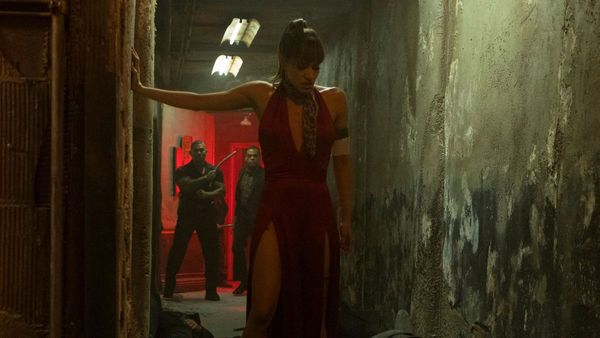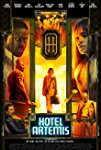Eye For Film >> Movies >> Hotel Artemis (2018) Film Review
Hotel Artemis
Reviewed by: Andrew Robertson

The Hotel Artemis is a secret criminal hospital known as a 'dark room', and as the film develops what its mix of characters and secret elements reveals is more than just black and white. It's neo-noir, in fact, heavily dependent on those first four letters; that secret criminal hospital is lit up like Christmas with a neon sign you could see from a helicopter even if it was being shot down.
Set in a future that's surprising in its datelessness despite the specificity of it being a given day in a given month in a given year that is, in fact, a Wednesday, this is a film with a strong cast, an intriguing premise, and despite its brutality and body count, disappointing in its execution.

There's clearly something in the water at the moment: between this, Lucid, and Terminal I count not fewer than three films anchored in a period of time that's somewhat akin to what today looked like from when Blade Runner was filmed, a time so distant that we're starting to get further from the introduction of flat screens and mobile telephony than those visions of the future were from colour television and ARPAnet. There's definitely something in the way that these films borrow from the steady state of the Matrix as a depiction of technology, something that makes these feel like the 1990s never ended. There's definitely something in the way that Hotel Artemis wears its debts on its sleeves, rolled up or revealing chips under the skin if not on shoulders, in decades on borrowings from decades on borrowings - nicely suited figures with code-names that aren't colours but holiday destinations.
When it's made a point that a character has never left the hotel then it's likely that them leaving the hotel will be part of the point, when it's made clear that there is encroaching disorder without and comprehensive rules within then it's likely that there will be a reversal, and when Jeff Goldblum turns up things will usually get a little weird. No surprises here.
Jodie Foster, whose real name we'll learn, but let's call her 'Nurse', is the proprietor. Her establishment is one of a system, perhaps no more or less improbable than John Wick's system of Continental Hotels and sidearm-slinging sommeliers, one where membership grants entrance, medical treatment, no questions asked. Jodie Foster's quality is never in doubt. She's capable enough to add meaning to shuffle, to scurry, to gesture and glance. It's a diverse cast, one full of familiar names, and that's something it shares with Terminal, beyond tone, palette, plot elements - they've both even got a major gangland figure called 'Mr Franklin'. Here it's Goldblum, the wolf-king, a figure around whom legends have grown. Not kind to thieves, even ones as suave as Sterling K Brown. Not fair to employees, even at a remove like Dave Bautista's (dis)orderly. Not forgiving of sons, even ones whose loyalty is writ in ink like youngest, weakest Crosby, a sometimes-ragged Zachary Quinto. Other dangers lurk beyond filial ambition. Charlie Day's Acapulco isn't quite stir crazy, but in loco parentis the Nurse is not sufficient to have him behave. Sofia Boutella's Nice is not (and it's worth noting that Artemis is the huntress), but she's not alone - other eyes are watching.
Three-dimensionally printed livers, rotgut bourbons in velvet-lined bar-rooms, diamond-pure mcguffins created with the stroke of a pen, there's a line more easily drawn between the Los Angeleses of Chandler and an endless crawl of crime movies. This is a film that will Speed for a Drive in that Heat, show Harsh Times in that Den Of Thieves; despite dream sequences it'll save itself a detour down Mulholland Drive; despite its finality it never becomes as problematic as Chinatown, and in that context it's ever harder not to draw parallels as convenient as grid-aligned car-parking, as dry as a city fed from someone else's desert.
Nestled in the credits (including a sequel friendly mystery that'll play just as many audiences are halfway down the stairs) are the names of concept artists. Simon Stahlenhag who might be the closest we have to a Syd Mead who isn't Syd Mead, 'Jock' (Mark Simpson, responsible in part for The Losers, a 2000AD veteran. The look is (as with terminal) reminiscent to me of Tharg's organ, and though one could draw comparisons to DREDD's Aristotelian unity there's also a comparison to yet another film that feels the same though it is different, The Raid. There's a fight in a corridor that perhaps owes as much to Columbiana and Harley Quinn's elevator shenanigans in Suicide Squad, and for all the viscerality of seeing people going through walls while Dave Bautista's about (shades of Blade Runner 2049) there's too much and too often the sense of having seen these things before.
The soundtrack's great, but those juxtapositions bring to mind others - the presence on-screen and in-ear of Father John Misty will be a treat for some, but there's not enough of anything here to leave anyone satisfied. It's never quite crisp enough, never quite definite. There's effort, an electric hum, a glow, but for all the lightness and visions and torches borne and spots shone it never quite gels.
A début feature for Drew Pearce, whose CV includes real world superhero TV series No Heroics (viz 2000AD alum Alan Moore's Watchmen), screenplay duties for multiple identity superhero sequel Iron Man 3, and a similar role for similarly complex Mission: Impossible - Rogue Nation, this is entertaining but not new. There are elements that could be replaced to create something that feels the same with different trappings. One hesitates to say 'by the numbers' when they've been so carefully filed off, and in genre and in tone there is perhaps intent in there not necessarily being anything now. It needn't be LA - it could be New Orleans for a more southern comfort, Paris offers a few luxury marques if one is feeling brand-y, there's a long enough history of opiates and drug-seeking behaviours that any dive-bar's glasses would hold the appearance of sham pain, that any joint would carry air that Bogart could have breathed no matter how shocked the local constabulary might get about it.
The problems the film creates and solves are ones Mike Pondsmith was predicting for 2013 back in 1988, and though he launched D10s of cyberpunk adventures he was cribbing heavily from an optician's worth of mirrorshades. So too this film.
Eye(s) covering, reflecting are perhaps the best idea here - concealing, revealing, not necessarily new, not necessarily fashionable, but cool enough - for some. Hotel Artemis is worth checking out if a narrowly near future LA is somewhere you're happy to visit again.
Reviewed on: 22 Jul 2018

















